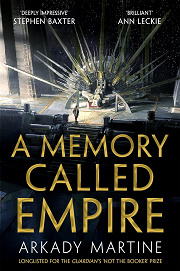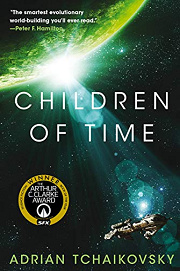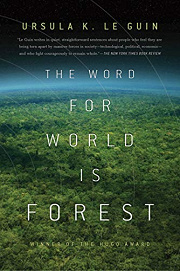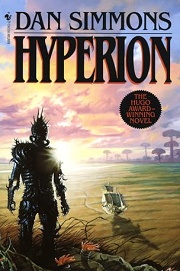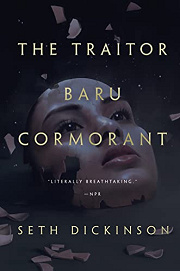Share your thoughts in a quick Shelf Talk!
Dune by Frank Herbert
Across a desert empire where spice fuels power and prophecy, a noble house faces treachery, survival, and the awakening of a destiny tied to the sands themselves. Vast in scope and unforgettable in vision, Dune is the landmark epic that redefined science fiction.
Have you read this book? Share what you liked (or didn’t), and we’ll use your answers to recommend your next favorite read!
Love Dune but not sure what to read next?
These picks are popular with readers who enjoyed this book. Complete a quick Shelf Talk to get recommendations made just for you! Warning: possible spoilers for Dune below.
In Dune, did you enjoy ...
... knife-edged imperial politics, courtly scheming, and a young outsider navigating a treacherous empire?
A Memory Called Empire by Arkady Martine
If the dueling agendas of House Atreides, House Harkonnen, and the Padishah Emperor hooked you—along with the Bene Gesserit’s quiet manipulations—then you’ll love how Ambassador Mahit Dzmare wades into Teixcalaan’s glittering court, where poetry is policy and coups unfold in verse. Like Paul learning to read the currents beneath Arrakeen, Mahit must decode the empire’s rituals (with the help of the razor-sharp Three Seagrass) while an assassination, a succession crisis, and a secret implant threaten to unmake her. It’s the same intoxicating blend of statecraft and peril that turned the spice trade into war on Arrakis.
... meticulous culture-building shaped by environment and evolution?
Children Of Time by Adrian Tchaikovsky
If the Fremen’s stillsuits, water-discipline, and sandworm-spice ecology enthralled you, Children of Time delivers that same granular immersion—only across millennia. As Dune showed how Arrakis shapes faith and survival (through Paul, Jessica, and Liet-Kynes), Tchaikovsky traces an uplifted species’ entire civilization—religion, warfare, technology—evolving in lockstep with its environment, while humans aboard the starship Gilgamesh hunt a new home. The sense of systems-level design you admired in the desert is mirrored here in webs, drums, and biology-driven culture.
... ecology-driven conflict and the costs of exploiting a planet?
The Word For World Is Forest by Ursula K. Le Guin
If Liet-Kynes’s ecological vision, the Fremen’s water ethics, and the brutal extraction of spice under Harkonnen rule moved you, Le Guin’s novella hits the same nerve. On Athshe, human colonizers clear-cut forests and brutalize the native Athsheans, igniting resistance led by Selver—much as Fremen insurgency rises on Arrakis against the Harkonnens and Sardaukar. The clash between exploiters and a people shaped by their world echoes Dune’s warning: ignore a planet’s ecology and its culture at your peril.
... sweeping far-future stakes that braid religion, prophecy, and empire-spanning conflict?
Hyperion by Dan Simmons
If Paul’s prescient path, the spread of a galactic jihad, and the way imperial politics collide with destiny gave Dune its vast, heady scope for you, Hyperion offers a pilgrimage into the Time Tombs where the Shrike waits—a nexus of faith, fate, and war. As the Hegemony and Ousters edge toward catastrophe, seven travelers recount interlocking tales that echo the epic breadth of Arrakis’s saga: prophecy-laden, theologically charged, and civilization-shaking.
... a conquered people's resistance from within a sprawling empire?
The Traitor Baru Cormorant by Seth Dickinson
If you were gripped by how Paul and Jessica embed with the Fremen—turning the conqueror’s tools back on the Harkonnens and the Emperor—Baru’s strategy will resonate. Raised by a colonizing power, she climbs the Masquerade’s bureaucracy to sabotage it from within, wielding finance, policy, and betrayal the way Atreides allies wield crysknives and sandstorms. As with Arrakis’s cultural clash, the cost of resistance—personal, political, and moral—cuts deep.
Unlock your personalized book recommendations! Just take a quick Shelf Talk for Dune by Frank Herbert. It’s only a few questions and takes less than a minute.

